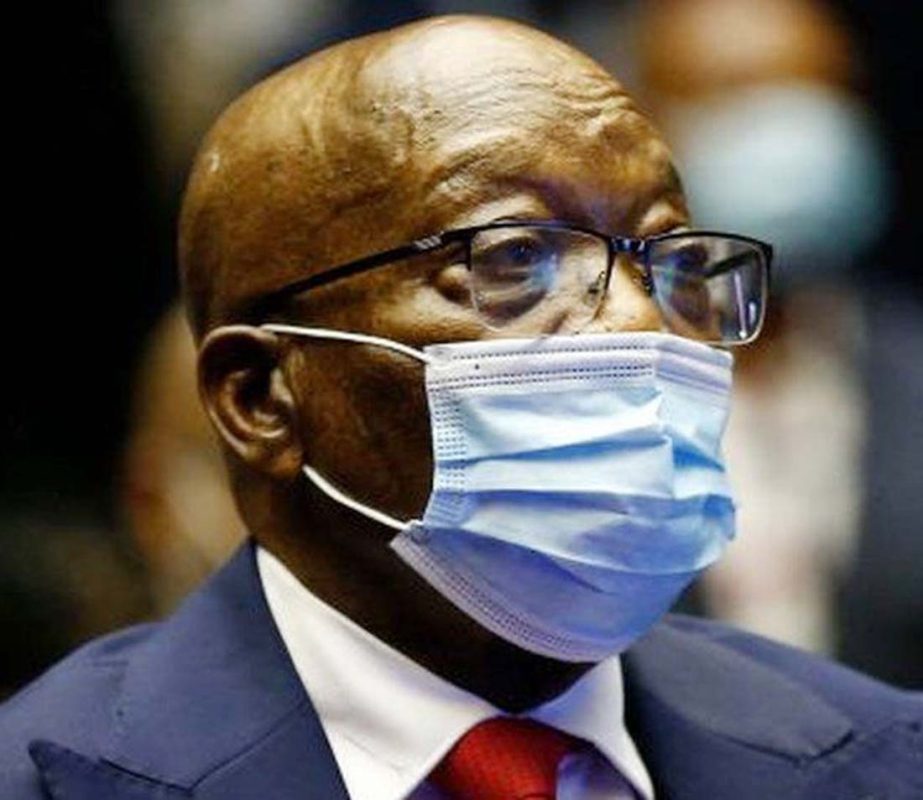
Jacob Zuma, the former South African president, has pleaded not guilty in a corruption trial involving a $5bn (£3bn) arms deal from the 1990s.
He is facing 18 counts of racketeering, corruption, fraud, tax evasion and money laundering.
Mr Zuma blames political enemies in the governing African National Congress (ANC) party for his legal troubles.
The arms deal involved buying new fighter jets, helicopters, submarines and warships.
But questions emerged about the deal months after it was signed, with some critics saying the government should have spent the money on fighting poverty.
Mr Zuma was South Africa’s president from 2009 until 2018 when he was forced to resign after a vote of no confidence.
On Wednesday crowds gathered outside the courthouse in Pietermaritzburg city in KwaZulu-Natal province to cheer on Mr Zuma, who still enjoys some popular support.
Inside the court, the 79-year-old politician looked frail and spoke quietly as he declared “not guilty,” after the charges were read, reports Andrew Harding, the BBC’s Africa correspondent.
The former president’s defence team called for the removal of state prosecutor Billy Downer, on the grounds that he had “no title to prosecute”.
But the presiding judge ruled that the matter would be dealt with on 19 July.
Newly democratic South Africa decided its military needed to be overhauled – and five years after coming into power following the end of white minority rule, the ANC government signed contracts totalling 30bn rand ($5bn; £3bn in 1999).
The deal involved companies from Germany, Italy, Sweden, Britain, France and South Africa.
Even before the allegations of corruption, the spending of billions of dollars on new fighter jets, helicopters, submarines and warships was contentious in a country where millions lived in poverty.
Others also pointed out that there was no credible threat to South Africa’s sovereignty to justify the spending.
Questions emerged within months, leading to official investigations into allegations of conflict of interest, bribery and process violations in the purchasing of equipment.
The allegations also formed part of US and British inquiries into BAE Systems. In 2010 the UK military contractor pleaded guilty to charges of false accounting and making misleading statements and paid more than $400m in penalties to end the investigations into questionable payments made to win contracts.
The following year Swedish firm Saab admitted that 24m rand was paid to secure a contract for fighter jets, but said the payments had been made through BAE Systems.
A new South African commission of inquiry into the deal, formed in 2011, concluded in 2016 that no new charges should be brought.

But a week later the High Court ruled, in a case brought by the opposition, that Mr Zuma should face charges over the deal. They had been dropped weeks before he became president in 2009.
He is alleged to have received bribes from a French arms firm via his financial adviser in order to protect Thales from scrutiny.
He was first charged in 2005, but a trial has never come to fruition – thanks to many challenges, other technicalities and backing from a strong faction within the ANC.
But the arms deal, among other scandals, dogged his presidency.
In 2018, the Supreme Court backed the decision that charges be reinstated and he now faces 16 counts of corruption, racketeering, fraud and money laundering. In total, he is accused of accepting 783 illegal payments.
A High Court judge said the decision by the National Prosecuting Authority (NPA) to drop the charges in 2009 was “irrational”.
The NPA had done so after receiving phone-tap evidence from Mr Zuma’s lawyers, which suggested there had been political interference in the investigation.
But the opposition Democratic Alliance (DA) pursued the case after Mr Zuma became president, winning a court battle to make the sealed recordings public and then arguing there was no evidence to warrant the charges being dropped.

